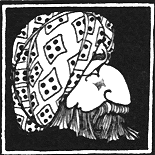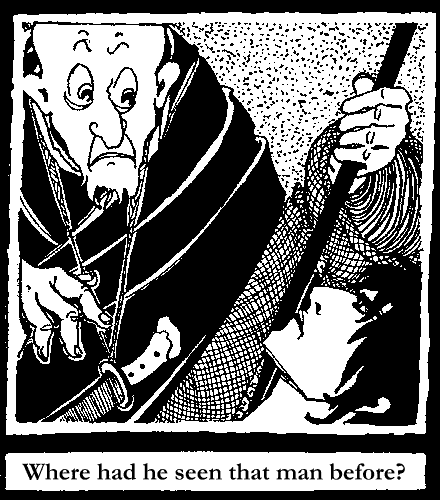 |  |
Wild at Heart Homepage | Contents | Previous Chapter
CHAPTER XIV
EXIT TOTA
1

“And that was the daughter of Piri Ram! That was the wench whom the greasy money-lender could subdue with a look! Verily, I must be getting an old, old man, and am fit only to tan hides.”
Such was Tota’s first thought as, recovering his breath with difficulty, he watched Parmala’s rapid disappearance. At a single blow he had lost a damsel, a fortune, and a large slice of his dignity, not to speak of a chip off the stock of his beloved muzzle-loader. His expression, therefore, was chastened, and it was more in sorrow than in anger that he followed her movements, sorrow that was plentifully tinged with amazement.
How she ran! For a girl who for months on end never put her nose outside her father’s door it was nothing short of prodigious. And she had used her hands too, had knocked him clean off his feet--Tota, who in his younger days could throw a buffalo! Well, there was no knowing.
“Only fools use persuasion with a woman,” was his grumbling verdict.
And a nice story it would make for the bazaar--after braving that tiger, of all tigers, to have been floored by that girl, of all girls.
“Hast thou heard?” He could imagine them saying it. “Hast thou heard how Tota the tiger-tamer went a-hunting, armed to the teeth? Did he meet with a tiger, thou sayest? Nay, never. But he met with a maiden, and she...”
Imagining their delight, he was profoundly thankful that his friends in the bazaar had been otherwise engaged, and it was with a feeling almost of relief that he finally rose to his feet.
After all, his reputation was still intact. Nay, it might even be enhanced.
“Behold,” he could say, “while ye were chattering and sheltering under elephants, I, Tota, have acted. I have visited the box. I have driven off the tiger. I, afoot and alone, as becomes a brave man. Would ye hear more?”
Yes, that would be pleasant. That would be very well, in its proper season. But, meanwhile, what of the girl? She still walked the earth. She still carried the papers. As she stood, in addition to her natural charms, she was still worth not less than a lac of rupees--or he had vastly misread her father’s anxiety. Would it not be as well, all these things considered, to see where she went? Sooner or later she must sleep, and, asleep, she would be distinctly easier to deal with.
Even in defeat, Tota permitted his tongue once more to wander across his dry lips. All was not lost, by any means. A little longer alone in the jungle, a little hungrier, a little more footsore, and the bird would sing a very different song. Likely enough, she would come to him on her knees.
“Bah! Persuade a woman? Persuade a buffalo!” muttered Tota, and spat in the dust. Then, with a heave of his gun across his shoulder and a grunt of renewed complacency, he took up the trail from where he had seen her disappear among the trees.
There was little difficulty in following her, for running feet make sharp prints. Clearly, she was heading for the river, just the barrier that she would naturally wish to put between herself and her father’s dogs. And since by no possibility could she have learned to swim, sooner or later she must have recourse to the ford. But--here he smiled to himself--she was by no means heading straight for that ford. Without undue haste he could forestall her, and there was a certain wedge-shaped rock which would serve admirably as a watch-tower. There he could sit in the sun and wait. Then--a pleasant little surprise for the wench who scorned an old man!
So, a couple of hours after Nanga had conceived his trap for the tiger, Tota the tanner adopted precisely the same tactics for catching the girl. Disregarding the trail of footprints, he made straight for the rock; he was perhaps a quarter of a mile from his goal when he first heard the babel of apes ahead.
He stopped and listened to that strange medley of sound. Obviously enough there were a great many apes; obviously, too, they were greatly interested in something.
His first thought was “Tiger!” and he unhitched his gun. Then he reflected that, when langurs see tiger, they get into a tree and cough at him. Whereas this noise came from the ground.
Nor was the note quite that of alarm. Of anger, rather, like the bickering of dogs on the worry. It puzzled him, for he had never heard it before; and, cocking his gun, he quickened his steps.
Soon he could see the gray shapes and the waving white tails just within the fringe of the wood. There were indeed many apes, more than he had ever seen at a time. Two hundred, three hundred, and all fighting!
“Shabash!” said Tota, who enjoyed a fight from a safe distance. “Shabash, bandar log!”
This was something to talk about, this fight. Told after a good dinner, over a good fire, this would rival the wars of Hanuman. Ten thousand Terai apes! Twenty thousand apes from the hills! A battle royal for Kotahbagh ford! Wah! Shabash!
Stay, though: were they fighting? Not one another, at any rate. There was something in the middle of that mass--something struggling, something brown, not gray--with long hair. They were worrying it--all of them.
The girl! By the tail of Hanuman himself, they had got the girl!
The papers, too! They would tear the papers to shreds. It must stop. At all costs, it must stop.
He threw up his gun and fired into the brown.
Thus it was that Nanga, at his last gasp, heard a sudden crack of sound, too shrill for thunder, and felt smoke in his nostrils. The buzz of triumph and rage was checked in its very ecstasy, and for a moment the little voices quavered on a silly note of consternation, punctuated with yelps. The cold hands ceased suddenly to clutch and tear.
Then, it seemed, a wind swept over his body--over and away.
2
For the moment Tota was staggered at the result of that single shot. True, the gun had been loaded with buckshot and rusty nails, and a double charge of black powder behind them. Still, fifty paces was long range for routing an army, even of apes. Wherefore, his first action, after recovering from a kick in the shoulder worthy of a buffalo’s powers, was to rub his hands in self-congratulation at this sterling addition to his promised recital in the bazaar. Next, he listened appreciatively to the sounds of flight--the splashings through the river, and the crashings among the branches on the other side, dwindling, dwindling among the hills. It crossed his mind that there would be no marauding of Kotahbagh property for a week to come, at least. Then, as an afterthought, he recollected the girl. She was lying very still.
His first doubts of her identity arose when he came nearer and saw that the figure on the ground lacked even the modicum of clothing that was looked for in the male sex; whereas the girl had been decently, if untidily, garbed in a dark sari, not a shred of which could be seen.
He paused; looked carefully; looked again from another angle.
No, this was not the girl, nor, for that matter, any girl. Who, then, could it be?
Tota glanced round cautiously, almost guiltily. The prospect of pilfering any article of value from the body of an entirely naked man seemed somewhat remote. Still, one could never be sure. There might, for instance, be an amulet round the neck, and amulets were occasionally made of silver. Hillmen, again,--this might well be a hillman, for hillmen were always uncouth, even when they were dead,--often wore chunks of rough amber on a string. If the man were alive, a chunk of amber would not be grudged to his preserver; and if he were dead, as seemed probable, it would not be missed. The body, all things considered, surely was worthy of closer inspection.
Of such an impersonal nature were his secret thoughts as he made a slight detour, approached gingerly from the rear, and examined the still form at his feet.
Alas! there was no amulet, not even a single amber bead. The boy--for boy it was--was as innocent of personal adornment as was Tota himself.
Yet, disappointed as he was, he did not at once turn away. Even when he realized from a flicker of a pulse in the throat that the boy was alive and therefore, presumably, of no further interest, he did not depart. For the figure at his feet intrigued him. The like of it he had never seen. There was a wildness about it, surpassing the wildness even of the hillmen. Who had ever set eyes on such shaggy hair? And, positively, talons instead of nails! Who had ever seen a skin that held together tolerably well, in spite of the mauling of three hundred apes? Tota at least, in a lifetime’s familiarity with hides, had never set eyes on such a tough one.
“Wonderful!” he muttered, for it interested him professionally. “Thou wouldst make good leather, thou!”
At the sound of his voice the boy stirred.
3
Nanga’s first thought was that the apes had stolen his skin, for he felt raw from head to foot. He could hardly believe that they had not left their claws sticking into him, for innumerable thorns seemed to be pricking him, and he ached intolerably. But at least he could move his arms and legs, though the effort was painful; and, as his breath came back to him, he began to feel better. But, dizzy still, he did not yet open his eyes.
They had gone: that was clear. How, why, he knew not. There had been a flash and a roar, and they had gone like the wind. Doubtless, if they had not gone, he would have been dead by now; he knew that perfectly. Yet he had no sense of thankfulness for the escape, since his mind was full of the chance that he had missed, the chance that might never come again. That pool, with the overhanging tree to drop from, with the sudden deep water--in all his days he might never have such an opportunity again, for generally the tiger crossed at dawn by the open ford, while the mist was still on it. He had owed his chance solely to the lateness, to the glare of day; and now he had lost it.
His rage knew no bounds. He hated the apes far more for balking him of his revenge than for mauling him within an inch of his life. His eyes, when he opened them, were dark with anger.
They glared straight into the peaky, perplexed countenance of Tota the tanner, who was still wondering anxiously what manner of youth he had found. Anger was momentarily forgotten in the shock of amazement.
A man! An old man, yellow-pated and shrivelled, like a bald bird! Where had he seen that man before?

He promptly closed his eyes, and remembered.
He had seen him with others, that very morning, out of a tree. They had come down from the village, had peered about for a while, and fled, thereby proving themselves of even less account than the monkeys. This man had been one of them. He had been the last to come and the first to go. Yes, this same old man.
But stay: he had seen him once before that, once long ago. One evening--it was coming back to him--a leopard had killed a goat, and this old man had killed the leopard and had stripped off its skin. He himself had sat up in a tree and watched him prodding and slashing with something bright that he had had in his hand. The same old man again; and now, for the third time, the same old man!
From curiosity, and nothing else, he opened his eyes again. At the same instant Tota bent down solicitously, with the modest purpose of putting a few searching questions as to the stranger’s ability to pay for any attentions that might be forthcoming at the hands of his preserver. Thus it happened that, as he stooped, his flaying-knife--dangling, half in, half out of its sheath, by a thong of woven grass from his neck--swung out and hung within a few inches of Nanga’s face.
Nanga recognized it instantly. It was the identical bright thing that had so neatly ripped the leopard’s belly open. He had admired it and wanted it at the time, and here it was, dangling before his eyes like a ripe fruit, ready for plucking! Just at his very time of need, it was actually being proffered to him by this queer, birdlike being, appearing so suddenly from no where. And if it could rip a leopard’s belly, it could surely make some impression on a tiger’s.
His hand stole out tentatively. The old man was mouthing his odd speech, with a sound like the rasping of rough stones together, but he paid no heed to it. He was dimly wondering which would snap first--the shriveled neck or the greasy grass thong--when he caught hold of the prize, clutching it solemnly and deliberately, as a baby clutches a toy.
There was a moment of supreme tension, during which the expression of kindly interest in Tota’s face changed to one of amazement, and from amazement to outraged alarm. Indeed, he feared for his life and struggled vainly to bring his gun into action.
Then, as the thong snapped, for the second time within one short hour he fell heavily backward.
4
As once more he pressed his creaking joints into service, Tota had the unique experience of seeing the boy, who but a few minutes before had been within an ace of an uncomfortable death, jump to his feet and run as he had seen no other boy run. Like an ape he ran, using his hands for guidance, and needing, seemingly, only a long tail to make the resemblance complete.
But the experience, though unique, had little consolation for Tota, since clasped tightly in the tailless one’s right hand was the precious knife, whose point was so nicely whetted as to be capable of ripping the skin of a buffalo from neck to rump without disturbing a drop of blood. Whatever his interest in the stranger’s movement, he could not afford to lose that knife. So he reached out for his gun; took careful aim at the place where the tail should so obviously have been; and pressed the trigger. But, instead of the usual explosion, there was only a dull click. He had forgotten to reload.
The boy who ran like an ape disappeared like an ape, down a precipice. And Tota, weary at length of adventure and craving the mental comfort that only an audience could properly provide, picked himself up and trudged sadly in the direction of the village. Within one hour he had found, and lost, many things. But one thing no one could take from him--a good story. And by the time he reached the beginnings of Kotahbagh bazaar he had fully decided to equip his foundling, for purposes of narration, with at least one tail.
Which decision and the subsequent return of the search-party, with a dead fakir instead of a live girl, represented the sole items of comfort in that melancholy morning.